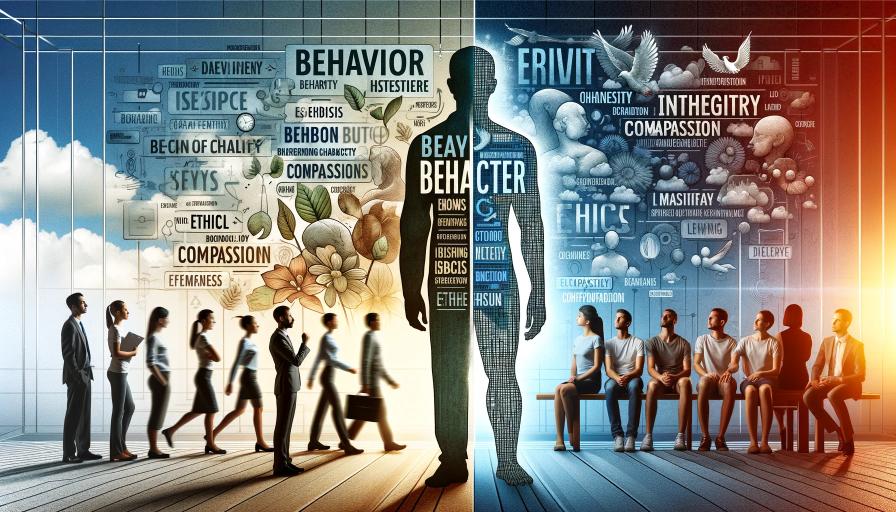In the quest to understand human nature and personal development, two fundamental concepts often come into focus: behavior and character. Although these terms are sometimes used interchangeably, they refer to distinct aspects of an individual's personality and actions. This article aims to provide a comprehensive analysis of the differences between behavior and character, exploring their definitions, intersections, and implications in various contexts.
Understanding Behavior
Definition and Characteristics: Behavior refers to the outward actions and reactions of an individual in response to external stimuli or internal thoughts. It is observable and measurable, often seen as the manifestation of an individual's thought processes, emotions, or environmental influences. Behaviors can be conscious or unconscious, voluntary or involuntary, and can vary significantly based on situations and contexts.
Types of Behaviors
- Conscious vs. Unconscious: Conscious behaviors are deliberate actions, while unconscious ones happen without the individual's active awareness.
- Voluntary vs. Involuntary: Voluntary behaviors are those under an individual's control, whereas involuntary behaviors occur automatically.
- Adaptive vs. Maladaptive: Adaptive behaviors are those that are beneficial and help individuals cope in various situations, while maladaptive behaviors are harmful or hinder a person's ability to function effectively.
Understanding Character
Definition and Essence: Character, on the other hand, is a set of inherent traits and values that an individual upholds. It is the essence of a person's moral and ethical qualities, deeply ingrained and relatively stable over time. Character drives how an individual perceives the world, makes decisions, and ultimately shapes their consistent patterns of behavior.
Components of Character
- Values: Deeply held beliefs that guide an individual's actions and judgments.
- Traits: Enduring qualities or attributes that constitute an individual's personality.
- Integrity: The degree to which an individual's actions align with their espoused values and principles.
The Intersection of Behavior and Character
While behavior and character are distinct, they are closely intertwined. Behaviors can reflect an individual's character, especially when observed consistently over time. For instance, a person who frequently demonstrates honesty in their actions likely has a character that values truthfulness. Conversely, a single instance of behavior, such as an act of kindness, may not necessarily indicate a kind character, as it could be influenced by specific circumstances or motivations.
Consistency and Context
The key to differentiating between behavior and character lies in consistency and context. Character is about consistent patterns over time and across various situations, whereas behavior can be more fluid, changing with circumstances. For example, a person may behave aggressively in a stressful situation, but this does not necessarily mean they have an aggressive character, especially if their usual demeanor is calm and peaceful.
Impact on Personal and Professional Life
In Personal Relationships: In personal relationships, understanding the difference between behavior and character is crucial. Recognizing that a loved one's negative behavior may not always reflect their overall character can foster empathy and patience. Similarly, appreciating positive behaviors as reflections of good character traits can strengthen bonds and trust.
In the Workplace: In professional settings, behavior often has immediate consequences, while character shapes long-term relationships and career progression. Employers increasingly value character traits such as integrity, responsibility, and teamwork, understanding that these traits drive consistent and positive behaviors over time.
Assessing Behavior and Character
Tools and Techniques: Assessing behavior is often more straightforward, involving observation and measurement of actions. Character assessment, however, requires deeper analysis, often through psychological evaluations, character references, and self-reflection.
Importance in Personal Development: Understanding one's own behavior and character is vital for personal growth. While changing behaviors can be relatively easier, developing character requires a more profound and often more challenging process of self-improvement and ethical growth.
Conclusion
Behavior and character, while interconnected, are fundamentally different aspects of human personality. Behavior is about actions in response to specific situations, whereas character is about inherent qualities and moral values. Recognizing the difference between the two is essential in various aspects of life, from personal relationships to professional environments. By understanding and reflecting on both behavior and character, individuals can embark on a meaningful journey of personal development and ethical growth.
